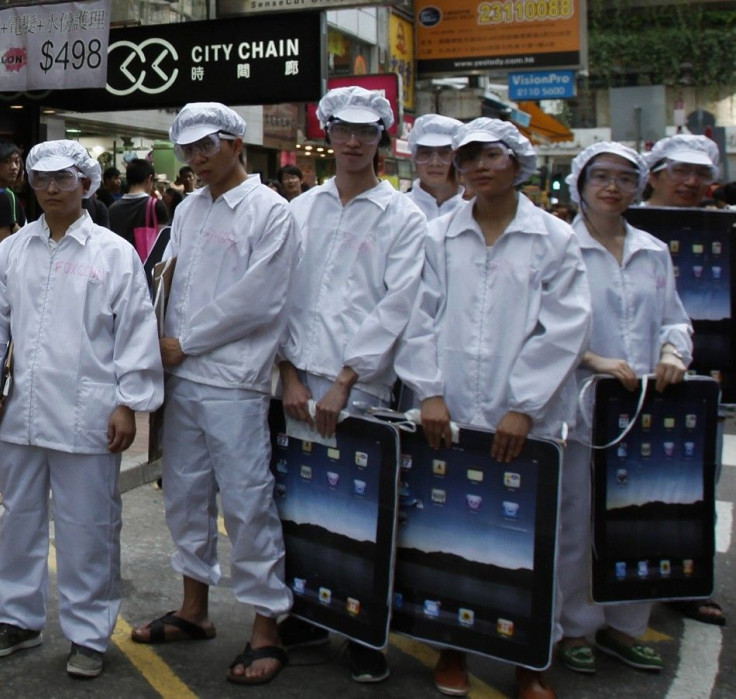Apple Supplier Pegatron In Trouble Again As Underage Worker Dies

Nearly five months after New York-based China Labor Watch accused key Apple supplier Pegatron of labor violations in July, the same Chinese workers’ rights group is again calling for answers from the Taiwan-based supply chain after an underage Pegatron worker died from pneumonia-related causes in October.
According to The New York Times, Shi Zhaokun, the factory worker who died, was reportedly able to secure a job thanks to a fake ID that said he was 20, when in fact he was only 15 years old.
According to documents provided by Shi’s family, Pegatron, which is the primary supplier of Apple’s iPhone 5c, reportedly make Shi work 79 hours in his first week, 77 hours in his second week and 75 in his third week on the job; all of these time periods exceed the legal limits, even though Pegatron continues to argue the contrary.
Pegatron said the work logs provided by Shi’s family “are of when the young man clocked in and out, and may not include breaks.” The company also added that Shi’s death was “not related to the workplace environment.”
In July, the China Labor Watch accused Pegatron and three of its subsidiaries of violating several major safety and environmental standards set in place by Chinese law and Apple’s own supplier policy.
“CLW’s investigations revealed at least 86 labor rights violations, including 36 legal violations and 50 ethical violations,” the China Labor Watch report said. “The violations fall into 15 categories: dispatch labor abuse, hiring discrimination, women’s rights violations, underage labor, contract violations, insufficient worker training, excessive working hours, insufficient wages, poor working conditions, poor living conditions, difficulty in taking leave, labor health and safety concerns, ineffective grievance channels, abuse by management, and environmental pollution.”
Though breaches of labor laws are not uncommon in China, Apple under CEO Tim Cook has become determined to maintain high standards of social responsibility within its overseas factories where the iPhone and iPad is produced.
Shortly after Steve Jobs’ death in late 2011, all eyes fell on Cook when the New York Times wrote two-full-length feature stories detailing the horrifying safety and environmental working conditions within Foxconn (nee Hon Hai Precision Industries), another major supplier for Apple. Since then, Cook has issued several personal apologies and has doubled down on Apple’s commitment to keeping its supply chains safe and responsible, namely by working with third-parties to keep factories free from pollution and corruption on a more consistent basis.
“Apple is committed to providing safe and fair working conditions throughout our supply chain,” Apple said in July, responding to the allegations against Pegatron. “We lead the industry with far-reaching and specialized audits, the most transparent reporting and educational programs that enrich the lives of workers who make our products. Apple is the first and only technology company to be admitted to the Fair Labor Association, and we are dedicated to protecting every worker in our supply chain.”
Apple has reportedly conducted 15 audits at Pegatron’s various facilities since 2007, and the iPhone maker says it has “closely tracked working hours at all of these facilities.” On average, Apple found Pegatron employees worked 46 hours per week, which is almost half of the alleged hours Shi spent in his first few days at the factory. Apple even noted how “excessive overtime is not in anyone’s best interest,” and that it would “work closely with our suppliers to prevent it.”
“Apple believes in transparency and accountability, both for our suppliers and ourselves. We realize being a leader in workers rights and being transparent with our findings opens us to criticism, but we believe strongly that we can make a big difference in the lives of millions of people by doing so and this provides us the courage and resilience to continue the journey. We are proud of the work we do with our suppliers to uncover problems and improve conditions for workers. By vigorously enforcing our supplier code of conduct, we ensure that our suppliers follow the same principles and values we hold true.”
Despite Apple’s commitment to labor rights, however, the China Labor Watch was still able to outline 17 inconsistencies between Apple’s supplier policy and the realities discovered within Pegatron, including the issues regarding work hour limits, underage labor, wage deficiencies, and discriminatory screenings.
“Apple has zero tolerance for lapses in the quality of its products,” China Labor Watch said in July. “If a quality issue arises, Apple will do everything it can to have it corrected immediately. But a lower level of urgency apparently applies in responding to labor rights abuses. Despite its professed high standards for the treatment of Apple workers, serious labor violations have persisted year after year. Apple must prioritize its efforts into halting the abuse of the workers making Apple products.”
The China Labor Watch’s July report also accused Pegatron and its subsidiaries of dumping metal-cutting fluids directly into the sewer systems; Pegatron’s Shanghai location was previously fined by the Shanghai government for a similar violation back in February, when the company polluted the local river with motor oil and cutting fluid. Researchers with the CLW said they saw chemicals being dumped down drains while investigating the plants in March and April.
© Copyright IBTimes 2024. All rights reserved.












